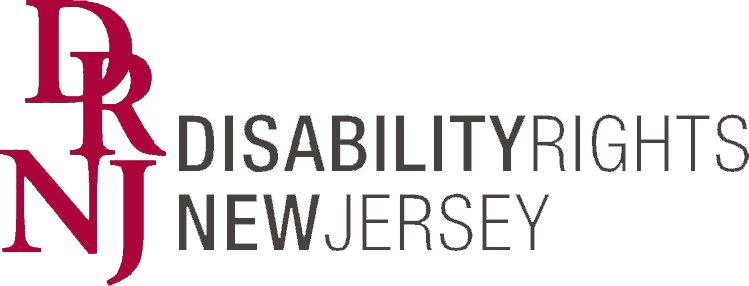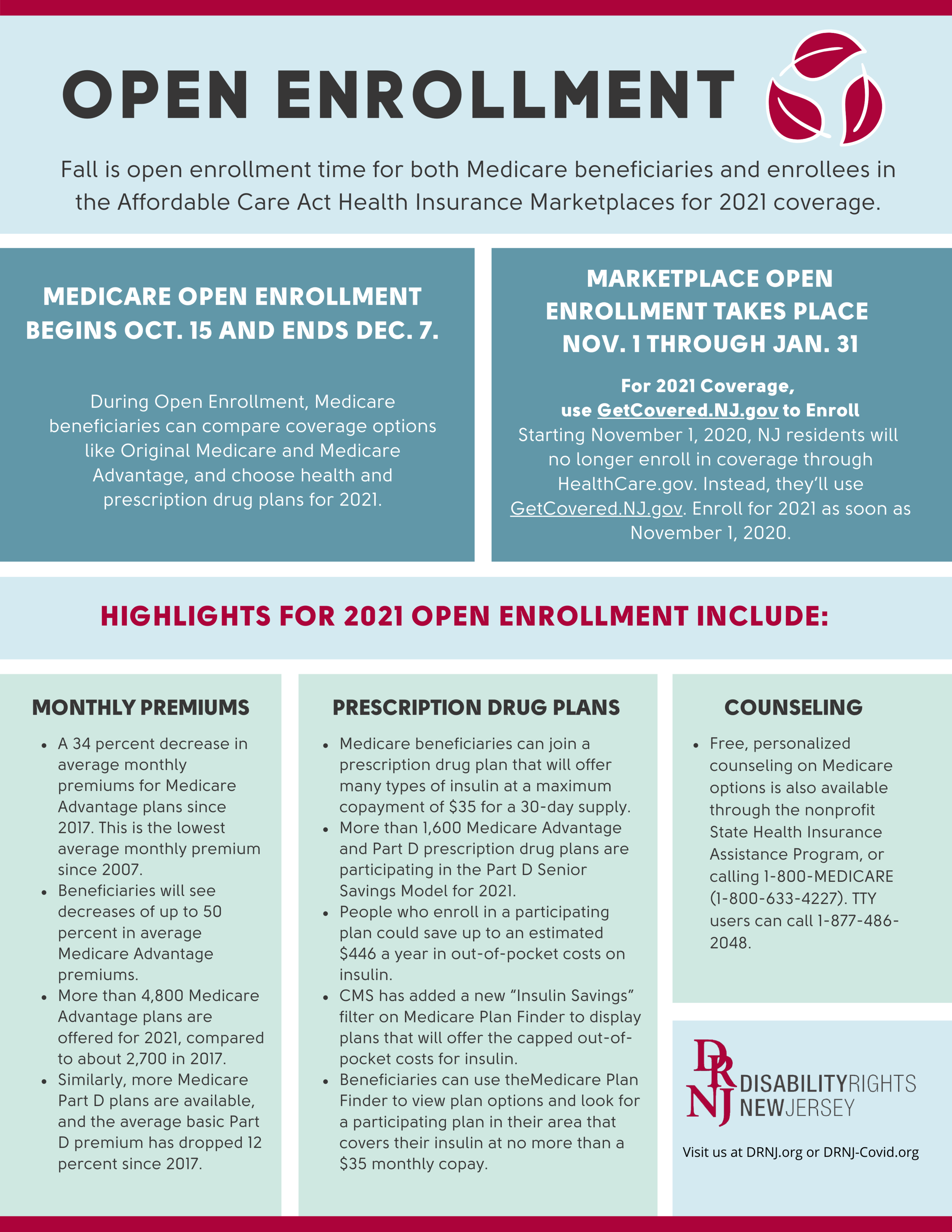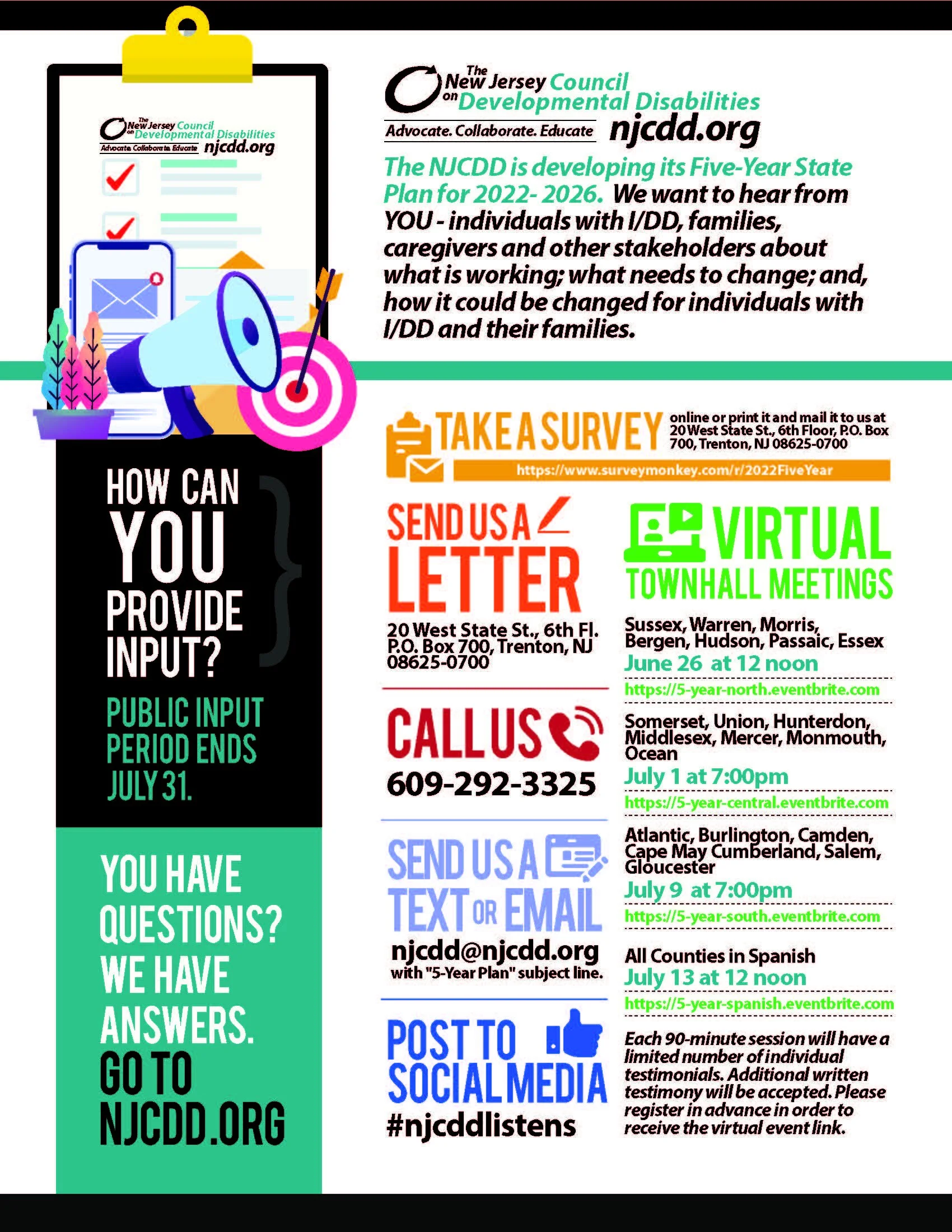
Valuable Resources
to Help You Navigate the COVID-19 Crisis
June 1
It’s Hurricane Season: How to Plan for an Emergency When You Have a Disability
2011 brought devastating floods to inland New Jersey with Hurricane Irene, only to be followed by Superstorm Sandy, the next year, the fourth-worst storm in U. S. history. Though downgraded to a tropical storm when it made landfall, Sandy was more than 1000 miles wide, three times the size of a typical hurricane. Its destructive winds leveled many communities along the coastline as it hit during high tide and merged with high- and low-pressure systems both north and south of New Jersey, earning it the title of a “superstorm.”
The severity and frequency of storms like Sandy and Irene will continue to increase as the Earth’s temperatures escalate, icebergs melt, and sea levels rise. New Jersey is especially vulnerable due to its low-lying coastline along the Atlantic Ocean. According to the American Meteorological Society, climate change will contribute to more hurricanes in general over the next 15 years, predicting 32 super-extreme storms with winds exceeding 190 miles per hour. As a result, residents of New Jersey, particularly the most vulnerable population, such as people with[DL1] disabilities, need to be ready for what comes.
What makes a hurricane dangerous?
A hurricane is a storm with violent wind that forms in the tropical waters and can cause significant damage from heavy rains, violent wind, or life-threatening storm surge. Due to the lethal nature of the storm, individuals may need to evacuate from their home. Long-standing power outages following a hurricane may also require evacuation, as was prevalent following Superstorm Sandy. Individuals with disabilities, especially those with mobility limitations and those reliant on machines to power life-saving devices may have a more difficult time during evacuation, as seen in the recent Hurricane Uri that devastated Texas and left the disability community without aid.
Hurricane season is now upon us. Because individuals with disabilities are especially vulnerable, and the impact of a hurricane can affect all areas of the state, it is especially important to make a plan for such an emergency and prepare an Emergency Kit in the event you must evacuate.
How to Make an Emergency Plan
Sign up for emergency alerts on your phone.
Create a support network of friends, family and neighbors that can help you in the event of an emergency. Include your health providers, medical equipment and assistive technology providers in your plan. Let them know how you will need them. Keep your contact list in a watertight container in your emergency kit. Learn more at www.ready.gov/kit.
Inform your support network where your emergency supplies are kept. You may want to give someone in your support network a key to your house or apartment.
Contact your health provider to know the process for getting an extended supply or replacement supply of medication should you need it.
Contact your local emergency management department and plan ahead for your individual needs. Learn about places to go in the event of evacuation and facilities with supplies you may need. Work with service providers of public transportation or paratransit to identify local or private accessible transportation options. Know the location of shelters that allow service animals if that applies to you.
Know the location and availability of more than one facility for dialysis. If dialysis is part of a health maintenance plan or other life-sustaining treatment, know where multiple facilities are located.
Know how to use medical equipment if a power outage occurs.
Wear medical alert tags or bracelets.
Make note of the best way to communicate with you in an emergency. If you have a communication disability, determine the best way others can communicate with you and let them know.
Plan how to evacuate with assistive devices or how to replace equipment if it gets lost or destroyed. Keep model information secure and note who provided it such as Medicaid, Medicare or private insurance. Also note the vendor or dealer.
How to Build an Emergency Kit
An Emergency Kit is a bag of essential supplies that you might need in an emergency, whether you must evacuate or if you decide to shelter-in place. Below is a list of various types of to-go bags that an individual might have ready depending on your circumstance.
Carry-on-you Kit
The carry-on-you kit is for the essential items you need to keep with you at all times. This might include cell phone and charger, flashlight and batteries, current prescription medication, emergency contact and health information.
Grab-and-go Kit
The grab-and-go kit is a bag, such as a small duffle that you can grab if you have to leave home in a hurry. It has the things you cannot do without and that you can carry and use without help from someone else. This should include any medication you take, your emergency contact list, health provider information, straws, mobility device chargers, a change of clothes, non-perishable meal bars, pet food for service animals, credit card, and cash.
Home Kit
The home kit includes water, food, straws, first aid supplies, clothing and bedding, tools, emergency supplies, flashlight and batteries, and disability-specific items. It includes all the things you would most likely need if you had to be on your own for days either at home or in an evacuation shelter.
Bedside Kit
The bedside kit includes items you may need if you are trapped in or near your bed and unable to get to other parts of your home. Some items would be important papers, cell phone, medication, bottled water, straws, flashlight and batteries.
Car Kit
The car kit includes items you will need if you have to evacuate the area and/or are in or near your vehicle during an emergency. This could include food, water, blankets, cell phone and charger, mobility device chargers, first aid kit, jumper cables and a toolbox.
https://adata.org/factsheet/emergency-supply
Additional Resources for Planning
There are additional resources and actions you can take to be prepared for a hurricane or emergency:
Follow state and local Office of Emergency Management (OEM) social media platforms. If your power goes out, but your cell phone is still working, you’ll be able to check online for notifications about the pending emergency.
Sign up for Register Ready, New Jersey’s special needs registry for disasters, which informs emergency management of people with disabilities who will need assistance during an emergency. Sign up for alerts on your phone through NJ OEM.
Volunteer for core advisory groups in your county or online groups for your area to assist in planning for emergencies and ensure the voices of people with disabilities are included in emergency planning.
https://www13.state.nj.us/SpecialNeeds/Signin?ReturnUrl=%2fSpecialNeeds%2f
https://www.facebook.com/READYNEWJERSEY
https://www.cdc.gov/ncbddd/disabilityandhealth/infographic-disability-impacts-all.html
https://www.fema.gov/assistance/individual/brochure
April 21
Rental Assistance Is Available to Help Tenants and Landlords
You might qualify for rental assistance, even if you are not facing eviction. There are many state, county, and municipal programs that can help you during the COVID-19 crisis. Each program has its own rules for who is eligible. Here is a list of resources for you to contact. We will update this page as we learn of more programs.
In times of crisis, there are many questions that arise with each changing day, as we navigate our way through the myriad of issues and concerns facing individuals with disabilities, and the loved ones that care for them. We’ve created this site to answer the call for information, gathered in one place to help those in need. As New Jersey’s designated Protection and Advocacy agency, it is our mission to preserve the human, civil and legal rights of persons with disabilities, empowering equality through persistence, awareness and expertise.
Below you will find a collection of important links that may be of help to you in your quest for information. Please also take a look at our FAQ pages for answers to issues facing the Developmentally Disabled community and concerns regarding the Economic Stimulus & Social Security benefits.
March 18
As part of section 3206 of the American Rescue Plan Congress has created the Housing Assistance Fund, which will provide $9.9 billion to the U.S. Department of the Treasury to give out to states, territories, and tribes to help homeowners facing hardships during the COVID-19 pandemic. The funds must be used by September 30, 2025. The Treasury Department can use up to $40 million for administration of the HAF and up to $2.6 million for technical assistance to programs and for oversight. For more information read the FAQ below:
February 2
As a second round of stimulus payments are sent out to Americans, some people have received those payments in the form of an Economic Impact Payment (EIP) prepaid card. This form of payment is new, however the cards are legitimate and can be used without fees.
The National Consumer Law Center (NCLC) has created a helpful resource with descriptions and visual representations of the cards so consumers can confirm that the card they received is legitimate, as well as instructions for using the cards without fees and obtaining replacement cards.
December 21
Between 194 and 198 million doses of flu vaccine have been prepared for the 2020-2021 flu season in America, and it's more important than ever for people to get vaccinated this flu season as the nation continues to battle COVID-19. Learn more about this year's vaccine and how you can get it.
Flu season begins in October each year, and it runs until the following May. Getting a flu vaccine can help you avoid becoming infected — and if you do become infected, you're likely to experience less serious symptoms than an unvaccinated person.
Cold temperatures, darkness, snow and ice present dangers to everyone regardless of age, but older adults can find themselves especially vulnerable during the winter months. Below are some things senior adults can do to stay safe this winter season, along with some helpful resources to help you stay safe during the winter and all year ‘round.
October 30
Fall is open enrollment time for both Medicare beneficiaries and enrollees in the Affordable Care Act Health Insurance Marketplaces for 2021 coverage.
Medicare open enrollment starts October 15 and ends December 7. During Open Enrollment, Medicare beneficiaries can compare coverage options like Original Medicare and Medicare Advantage, and choose health and prescription drug plans for 2021.
Marketplace open enrollment takes place November 1 through January 31. NEW For 2021 coverage, use Get Covered NJ to enroll in health insurance through the Affordable Care Act. Starting November 1, 2020, New Jersey residents will no longer enroll in coverage through HealthCare.gov. Instead, they’ll use GetCovered.NJ.gov. Enroll for 2021 as soon as November 1, 2020.
Disability Rights New Jersey has created an informative document highlighting the important changes to Open Enrollment for 2021 coverage through Medicare and Health Insurance Marketplace.
Click below to view details on Open Enrollment:
October 16
COVID-19’s devastating impacts motivate New Jersey to build a robust COVID-19 vaccination program. In January 2020, the State of New Jersey started actively tracking the outbreak of a novel coronavirus. Since the COVID-19 public health emergency was declared through Executive Order No. 103 on March 9, 2020, New Jersey has mobilized a statewide, data-driven COVID-19 response that includes healthcare capacity expansion, focus on vulnerable populations, scaling of testing, contact tracing and exposure notification mobilization, resource provision, and resiliency planning. The State informs COVID-19 efforts through transparent information to the public and through funding and technical guidance to local partners.
New Jersey began COVID-19 vaccination planning in the context of considerable unknowns regarding vaccine safety, efficacy, availability and timelines, federal distribution logistics, supplies and funding resources, public demand, likelihood of community protection through vaccination, and other factors. New Jersey submitted a Draft Interim COVID-19 Vaccination Plan to the Centers for Disease Control and Prevention (CDC) for feedback on October 16, 2020, but New Jersey will adapt its phased approach as unknowns are resolved.
October 6
New Jersey’s Long Term Care Ombudsman created a comprehensive Voting Guidance reference in addition to the guidance provided by Centers for Medicare and Medicaid Services.
September 17
Resources for Advocates Assisting with Eviction Prevention from the National Center for Law and Elder Rights
June 30
The New Jersey Council on Developmental Disabilities (NJCDD) needs your input as they develop a State Plan that reflects a comprehensive review of major service systems and issues as they affect New Jersey children and adults with intellectual and developmental disabilities (I/DD) and their families.
The 5 year plan outlines goals and activities that the NJCDD will implement in order to bring about system change and drives decisions about how staff and funding are used. Right now, NJCDD is developing its Five-Year State Plan for the period from October 1, 2022 – September 30, 2026.
This is where you can help.
NJCDD gathering input and they want to hear from individuals with I/DD, families, caregivers, service providers and other stakeholders about what is working for people with developmental disabilities; what needs to change; and, how it could be changed. The NJCDD is particularly interested in reaching under-served communities in New Jersey. Stakeholders can provide input through:
One of four upcoming virtual public hearings, including one in Spanish
An online survey, in English, Spanish, Chinese and Portuguese
A letter or email message to the NJCDD
A phone call to the NJCDD
Social media posts
The NJCDD is accepting input through July 31, 2020. To learn more, access the survey, and/or register for a hearing, click here:
Barb Coppens of Disability Rights NJ talks about the testing procedure for COVID-19 in an informative animated video.
June 18
As COVID-related restrictions in New Jersey ease and the state moves forward with the Governor’s multi-stage recovery and re-opening plan, families are understandably eager to visit with their loved ones who are living in group homes, supervised apartments and other provider-managed residential settings.
New Jersey Department of Human Services Division of Developmental Disabilities issued an updated residential screening policy, as well as new residential visitation guidance.
The new guidance on visits with family and friends will go into effect June 21, 2020, allowing time for providers time to prepare. Also, it is important to note that the new visitation guidance will be amended over time as we learn more about the virus. Any questions or concerns to the Division’s COVID-19 Helpdesk:
NJ Department of Health data dashboard with live updates on COVID-19
May 28
The need for See-Through Masks to help the hearing impaired has skyrocketed. HEAR Wisconsin is overwhelmed with requests and has provided instructions for making your own See-Through Mask. Below the green box labeled “See-Through Mask Request” is a link to download instructions for making the masks on your own.
May 27
The New Jersey State Bar Association (NJSBA), the sister organization to the New Jersey State Bar Foundation , launched a new service called Free Legal Answers, where volunteer attorneys answer COVID-19 related legal questions through a secure website.
New Jersey residents facing the myriad legal questions raised by the global COVID-19 pandemic have a new place to turn for help. NJ Free Legal Answers is an online legal advice resource that allows the public to post civil legal questions and get help from a volunteer attorney.
May 5
The American Academy of Pediatrics has provided guidance on returning to school with particular direction for students with disabilities.
April 29
With support from the New Jersey Department of Human Services, ACCESS at St. Joseph's Health in Paterson is offering help in American Sign Language to people dealing with anxiety and worry related to the Novel Coronavirus (COVID-19) outbreak. New Jerseyans can call the videophone helpline at 973-870-0677 for free, confidential support. Direct communication in sign language will be offered from 9 a.m. to 5 p.m. Monday through Friday by live trained specialists.
April 28
National Disability Rights Network (NDRN) Launches 'Know Your Rights' during COVID-19 Video Series
The COVID-19 pandemic is impacting every community in the nation. Shuttering schools and workplaces, slowing public transportation, and delaying community-based services. In this series of videos, the National Disability Rights Network explains what your rights are and what you can do if you believe your rights are being violated. We hope this series will help to strengthen self-advocacy, address racial inequities, and protect the rights/lives of people with disabilities.
April 27
Update on Economic Impact Payments for Dependents of Non-filers
People receiving Supplemental Security Income (SSI) who did not file 2018 or 2019 taxes, and have qualifying children under age 17, however, should not wait for their automatic $1,200 individual payment. They should immediately go to the IRS’s webpage and visit the Non-Filers: Enter Your Information section to provide their information. SSI recipients who have dependent children and did not file 2018 or 2019 taxes need to act by Tuesday, May 5, in order to receive additional payments for their eligible children quickly.
If people in this group do not provide their information to the IRS soon, their payment at this time will be $1,200 only. They would then be required to file a tax year 2020 tax return to obtain the additional $500 per eligible child. See below the document provided by Social Security for Economic Impact Payments for Social Security and SSI Recipients.
Agencies that provide information about the Coronavirus
NJ Division of Civil Rights has released a one-page fact sheet on civil rights and COVID-19.
Hope For Veterans - an organization dedicated to helping New Jersey veterans and veteran families keep or find housing and avoid homelessness.
National Disability Rights Network Launches "Stop The Spread in Jails & Prisons: Know Your Rights during COVID-19" Video
Mental Health Resources
New Jersey Mental Health Cares call line: 1-866-202 Help (4357)
offering extended hours, 7 Days, 8AM - PM
For Deaf and Hearing Impaired - St. Joseph's Access Center:
973-870-0677 Monday - Friday
NJ Self-Help Group Clearinghouse
800-367-6274



